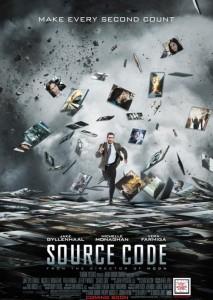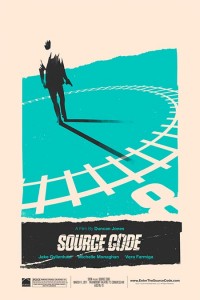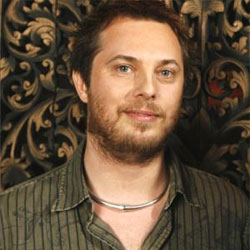 Source Code is a really good movie, a fact that may surprise folks who aren’t aware that it’s a smart, atypical science fiction movie. And that it’s directed by Duncan Jones, the man who brought you one of the best science fiction movies in decades. Moon. If you haven’t seen it, use this link and buy it and thank me later. The films tells the story of one man’s quest to prevent a terrorist attack in eight minute bursts as he’s transported into the body of a passenger on the train. It’s an old school mixture of detective story, parable on humankind’s tampering, and kickass thriller that is filled with some really smart and fun stuff.
Source Code is a really good movie, a fact that may surprise folks who aren’t aware that it’s a smart, atypical science fiction movie. And that it’s directed by Duncan Jones, the man who brought you one of the best science fiction movies in decades. Moon. If you haven’t seen it, use this link and buy it and thank me later. The films tells the story of one man’s quest to prevent a terrorist attack in eight minute bursts as he’s transported into the body of a passenger on the train. It’s an old school mixture of detective story, parable on humankind’s tampering, and kickass thriller that is filled with some really smart and fun stuff.
Source Code (Josh’s review, Renn’s review, Renn’s interview with a neuroscientist about the film) is Duncan’s second film and proof that we’re only seeing the tip of what this man’s capable of. He’s one of the freshest and most exciting new filmmakers we have. He came to Atlanta to promote the film, and I moderated a rather nice and fun Q&A session with him and the next day sat down with him for a chat. The results follow.
Also, if you like this coverage and the coverage linked above, please LIKE it or TWEET it or do something else to share it with your friends. We could use the help, and frankly… movies like this need all the support they can get. You won’t be disappointed.
Duncan Jones: Thank you so much for last night. We really do appreciate it, it was a fun time.
Nick Nunziata: It was a pleasure. We’ve done a lot of those Q&A’s but it’s not typically… I hate to use the term “fanboy favorite” kinds of filmmakers, but you fit! So it was cool. I think a lot of people felt a little closer to the material because of it. Which helps because Moon has resonated with people so strongly.
Duncan Jones: It’s crazy. I love it. It’s going to be fun to try and find something that I make that people feel as strongly about one day.
Nick Nunziata: Is it true that it’s part of a trilogy, or rather one of three connected stories?
Duncan Jones: You’ve got it kind of right. Some people have asked if there were going to be three sequels. No, but that world that we started to create in Moon, I love the idea of having two other completely independent stories that co-exist within that same world. And maybe entities like Lunar Industries and maybe characters like Sam Bell would make weird cameos in them, so they’d all be interconnected in one way or another.
Nick Nunziata: The same tone? That same kind of pacing and atmosphere that you created with Moon?
Duncan Jones: I dunno, I have a really good get-out in that in that this is a moon base so what’s going on back on Earth could be different.
Nick Nunziata: That blue bitch from The Fifth Element could be singing.
Duncan Jones: Yeah!
Nick Nunziata: That’s cool. Everything that comes out, we try to pigeonhole it and have an easy solution as to what it is. X meets Y equals this film. Moon, while it has soulmates in film history, it didn’t feel like anything of this time. I think Source Code has a lot of that too. It doesn’t feel like a modern era film. When filmmakers come up and been raised in this business, and the business is definitely at the forefront, you never know what their unique voice is. You came out the gates swinging with Moon and now this. It’s hard to know what your next one’ll be like.
Duncan Jones: That’s good. I like the idea that Source Code and Moon really do differentiate themselves in that way. Although there are common themes between the two, as films they both stand far enough apart so that, if you were to guess what my next film would look like and be it’s be kind of difficult.
 Nick Nunziata: You didn’t write Source Code, it’s your first as a…
Nick Nunziata: You didn’t write Source Code, it’s your first as a…
Duncan Jones: Director for Hire.
Nick Nunziata: Yeah but I hate that term, you know? I know what kind of commitment it requires to direct a film, how much investment and the relationships you form. So much more than just a paying gig.
Duncan Jones: Yeah, it’s more like adoption. You sort of take something on wholesale and become responsible for it.
Nick Nunziata: Did it force you to change your approach? To take someone else’s material and make it your own but also figure out how to balance those two visions…
Duncan Jones: That’s a tricky one. Obviously I was very, very fortunate… well we worked hard for it, to have the autonomy to make Moon the way we wanted to. It was my producer, myself, and Sam Rockwell. We were the ones who called the shots. Everything we wanted to do, that’s what we did. We had a small enough budget to do that. People felt comfortable that whatever we did, as long as we did a reasonable job with it and people would make their money back we’d be good and be able to make our film. In this case I’m obviously working on someone else’s script. I’ve read it, I liked it. There’s a lot of strong things in it. I have some of my own opinions on things we can tweak and what my interpretations would be. But I have a responsibility to deliver that script. I also have the responsibility to spend many many millions of other people’s money, people I don’t know and who only know me as a small British independent filmmaker. There’s a different pressure. But, on the other hand I had Jake Gyllenhaal who was totally in my corner. He’s the one who wanted me to direct the film. That immediately made things easier. I also had my producer Stuart Fenegan, who I dragged onto the job with me from Moon. I had him as a bit of a buffer between me and the other producers. I had Paul Hirsch, the editor of the film. He’s a legend and no one messes with him. He said to me a few days into the edit, “I’m your guy”. I don’t care about Jake or the producers. I edit for you, the director. He’s an amazing man and he kept to his word. Whenever we had a difference of opinion, Paul was always on my side.
Nick Nunziata: A movie like this could easily get fucked in the editing room. There are so many places in the film where could have happened and ruined it. We’ve seen it happen so often.
Duncan Jones: Yeah, it makes such a difference. When you try and fight any kind of fight on your own on a movie, it’s really hard.
Nick Nunziata: There’s a very sensitive backdrop to the story, you veer a little too much this way or that way you risk becoming pablum.
Duncan Jones: You can fall into farce, you can fall into something way too serious and dramatic and pretentious. All sorts of ways you can mess this up.
Nick Nunziata: Jake’s a guy whose body of work I respected but someone whose instincts and sensibilities I still haven’t pegged. To know that he was aggressive about this film and in choosing you and protecting you kind of gives me more of a vibe about the guy. It’s good to see him dedicated to something, that he’s not just that Prince of Persia guy…
Duncan Jones: Absolutely. Prince of Persia was him taking a shot in the way that every leading man has to, to get that known role that sets you up. Source Code was him saying “you know what, I want to do things in a different way”. He wanted to work with me. He loved Moon. He loved what I did with Sam in Moon. We approached it as a team and had a great time doing it.
Nick Nunziata: He has sneakily put together a pretty badass resume.
Duncan Jones: Yeah, absolutely. When you think about what films he’s been in…
Nick Nunziata: Fincher, Ang Lee, you. He’s made so many really good choices, and diverse ones.
Duncan Jones: DiCaprio’s like that too, from interesting director to interesting director.
Nick Nunziata: He’s the mold. Damon too. You get to where you’re like “put them in charge, let them run the business” because the old cats don’t get it. And on top of that, their humanitarian efforts. Makes me feel really, really small.
Duncan Jones: Ha!
Nick Nunziata: Since I’ve been doing this site for well over a decade, we’ve always been championing Sam Rockwell. From Safe Men. Galaxy Quest. And each new film. thought Confessions of a Dangerous Mind was going to break him wide open.
Duncan Jones: We all did.
 Nick Nunziata: We’ve been rooting for him all this time, and then Moon came along. It showcased the Sam Rockwell we loved and a whole lot more.
Nick Nunziata: We’ve been rooting for him all this time, and then Moon came along. It showcased the Sam Rockwell we loved and a whole lot more.
Duncan Jones: A whole bunch of Sam Rockwells!
Nick Nunziata: I think finally, people get him. I think you helped get him over the hump.
Duncan Jones: I think the timing is good. For his sake I wish it’d happened earlier. He’s the same age as me and if he wants to be a leading man he’s got the next five or ten years to make that happen.
Nick Nunziata: At least a leading man in Hollywood’s definition. Gene Hackman was able to do it much later…
Duncan Jones: That’s true. Absolutely true.
Nick Nunziata: And Sam’s got those kind of chops.
Duncan Jones: That’s actually very true. That’s a great and interesting parallel. He could end up like a Gene Hackman.
Nick Nunziata: He’s a character actor. And he could be a leading man but his ability to bounce between roles is amazing. If people can mine that, the possibilities are really interesting. You mentioned Blade Runner being your favorite film yesterday. There’s only a handful of films that are as timeless as that one.
Duncan Jones: After they fixed that one final shot where it used to be daylight and is now night time. I don’t think there’s a single frame I’d change. Even with modern effects.
Nick Nunziata: I don’t know what to attribute that to. Ridley Scott was…
Duncan Jones: On his game.
Nick Nunziata: He was channeling something otherworldly. Sometimes we’ll still see glimpses of that guy, though he has a lot of toys that he uses now. When you approach a film conceptually, whether it be this or Moon or some of these ambitious new projects you’ve been teasing, what are those intangible things that set off triggers in you? To establish something that feels real today and that will endure?
Duncan Jones: I’m way too new and don’t have enough of a catalog to know my stuff will endure yet. I hope they do, I hope Moon does. You have to have a script you feel utterly convinced is something that will draw and audience in. You have to have a protagonist the audience can really attach themselves to, a leading man the audience will care enough about so that they’ll feel something if there is an event or an emotional roller coaster along the way. The script is really the start of it. The visuals really kinda take care of themselves after you know what you’re trying to do, at least for me.
Nick Nunziata: You don’t strike me as a bells and whistles, ultra modern style of filmmaker.
Duncan Jones: I’m not really coming into this with ‘a style’. I’m not a slow-mo guy, I’m not the ‘doves over the shoulders’ guy. I don’t approach making films that way. I will try and make sure that there are moments in the film that have signature visuals that you can remember and that will stand out. I’m not trying to slapdash stick a style on a film.
Nick Nunziata: You’ve teased going into some new genres, but you have one more on the way.
Duncan Jones: One more science fiction one and then I’m going on sabbatical from the genre.
Nick Nunziata: It’s pretty ambitious?
Duncan Jones: It is ambitious and I’m very excited about it. I wish I could tell you more but I really can’t. Other than the fact that… (making a triangle shape, hitting each point with each title) If Moon is here, and Source Code is here, then that one is there. It’s the third part of the triangle.
Nick Nunziata: The growth in budget for Source Code obviously gave you some new tools. In learning how to shoot those effects and considering the next film you’re doing, do they intimidate you?
Duncan Jones: Not at all. I love effects. When I decided to go to film school… and someone just reminded me how long ago it was, like fourteen years ago… I thought it was more recently! When I went I started off in low budget music videos and commercials. The reason I was able to make some money in commercials was because I became good with special effects. I lot of the commercials I did was stuff like plants growing and fruit growing into bottles of Heinz ketchup and stuff like that. That was my thing so I loved special effects. I feel very comfortable with them. It becomes a balancing act because when you want to do special effects you slow down your shoot, you increase your costs, and then the real discipline becomes about when you use the special effects. Not how, but what is the right scene. When is the right situation. It may not always be the spectacular event. There may be more subtle reasons to use them.
Nick Nunziata: You’re a role model to so many filmmakers, Duncan. Thanks for your time and you can count on CHUD and its readers to be with you wherever you want to take us.
Duncan Jones: Thanks so much, Nick.
Source Code opens today, Friday. April first. Don’t be a fool. See it!